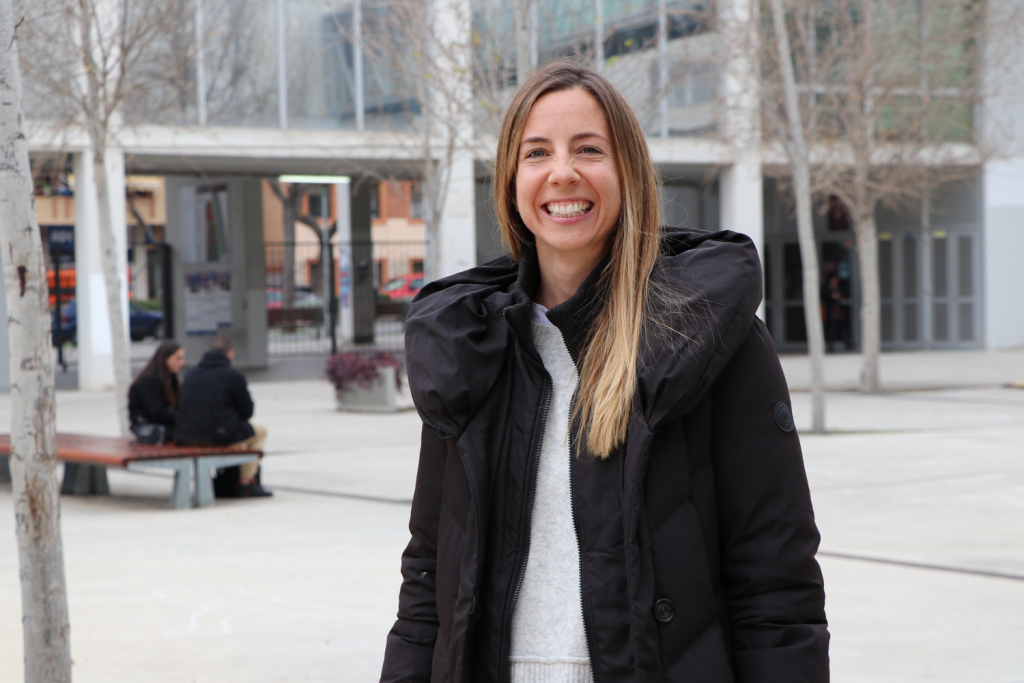19/12/2019 Interview
Laia Grau, administrative specialist at the Decentralised Administrative Management Unit of URV
“Visiting other universities allows you to incorporate the best practices that you have seen elsewhere”

Laia Grau manages education and research projects. She completed two mobility visits at Germany and Belgium
Laia Grau manages education and research projects at the URV (Campus Catalunya UGAD). In 2019 she completed two mobility visits: one at Viadrina European University in Frankfurt an der Oder via the INU staff shadowing programme, and a staff week at the University of Ghent, a member of the SGroup network.
What motivated you to do staff shadowing in Frankfurt an der Oder?
I’ve wanted to see how the management and promotion of educational and research projects was organised at a foreign university for quite some time. I think it’s very rewarding to get out of the office and the university to see how others approach key issues in our work at the UGAD.
What differences and similarities did you find between the organisation and operation of the URV’s research management unit and the one at the German university?
Viadrina European University is a young university, like the URV. They have about half as many students as we do and specialise only in social sciences. That means they have a lower volume of projects and less research support structure than the URV. Their organisation and operation reminded me of our own before the creation of the UGAD, when we worked with the Research Management Service (RMS). So, in perspective, I think our organisational change has been very positive. The main difference is that they have a system of financial incentives for researchers with coordinated European projects.
What did you learn during staff week at Ghent University, which specifically addressed the management and administration of research projects?
The title of the staff training week in Ghent was Erasmus on the Horizon: Managing and Administering EU projects in Research and Education Beyond 2020. It consisted of three days of immersion in all aspects of project management: support structures and incentives for research and education, promoting researcher participation in funding programmes, good financial management practices, project execution, dissemination, exploitation and impact of the projects, as well as other topics. I found it particularly interesting that it was geared towards both research projects (H2020) as well as education projects (Erasmus+), because, despite the obvious differences between the two programmes, creating synergies is essential to linking education, research and innovation in universities.
When is it advisable to do staff shadowing and when is a staff week a better option?
In my experience, staff shadowing gives you an in-depth look at how your specific area of interest at the host university works and how it’s organised. It allows you to participate directly in their day-to-day work, to see how they approach and solve the specific issues and what tools and resources they have. A staff week, on the other hand, is not a bilateral exchange like staff shadowing, but rather aims to put the different participating universities in touch with one another and to create a network, and is organised around training objectives, cooperative goals, and the exchange of good practices about a specific topic.
How useful is it to find out about the experiences of other universities?
It lets you see your work from a distance, reflect on what we do from day to day, and take the best practices you’ve seen and incorporate them into your own work. It also allows you to become more aware of what you’re doing well and give it the value it deserves.
How would you characterise the research management at the URV compared to that at other universities you’ve got to know?
There are universities in northern Europe that have a lot of resources to invest in this area. This becomes evident when they tell you about the incentives to participate in the programmes they have, the support staff to researcher ratio and the project-management software available to them. I believe, however, that we at the URV are doing very good work. We have a structure for promoting and managing education and research programmes that not all universities have. Our rate of participation in the H2020 and Erasmus+ programmes is quite high, and I believe that our management system, although it can always be improved, is an example of good practices and innovation in the professionalisation of project management. This was also conveyed to me by colleagues at staff week after my presentation.
Have you introduced changes or improvements in your work based on your experiences?
The experience of staff shadowing allowed me to connect some of our researchers with researchers from Viadrina. We’ll see if any of those connections lead to anything. Some thoughts also arose during the experience that will need to be discussed with my other colleagues and the coordinator of the UGAD in order to introduce possible improvements that I’ve identified. For example, the organisation of the UGAD in expertise clusters according to funding programmes, a mixed management model for the budgets of capacity building international cooperation projects, the creation of brochures summarising financial information (Financial Info Sheet) for each type of action in Erasmus+, among others.
